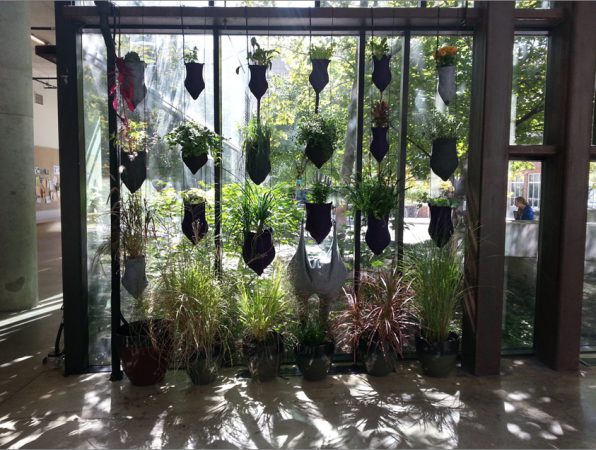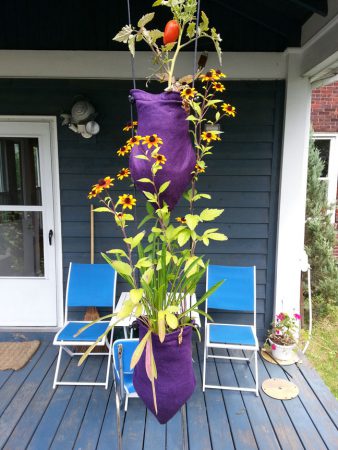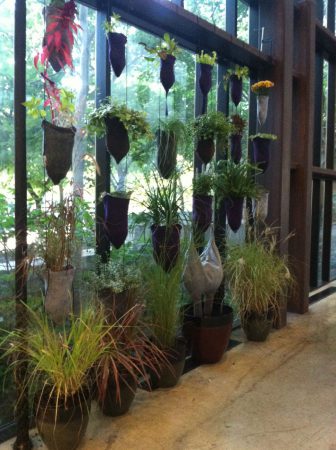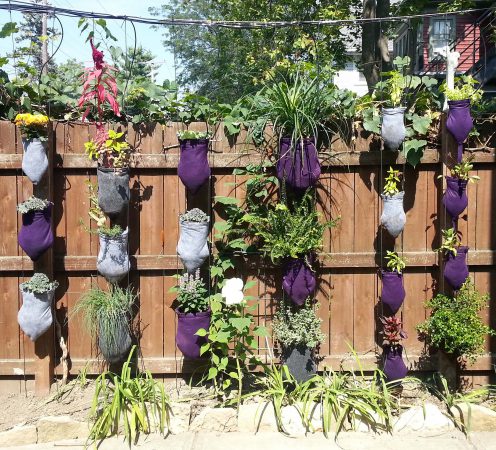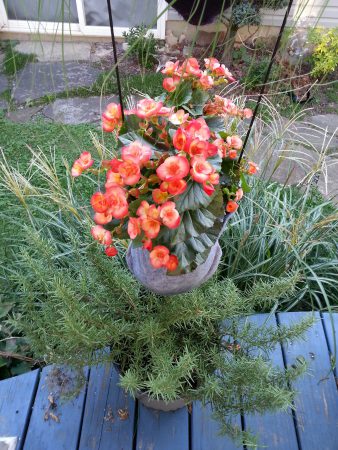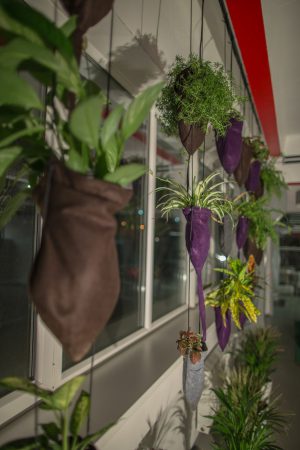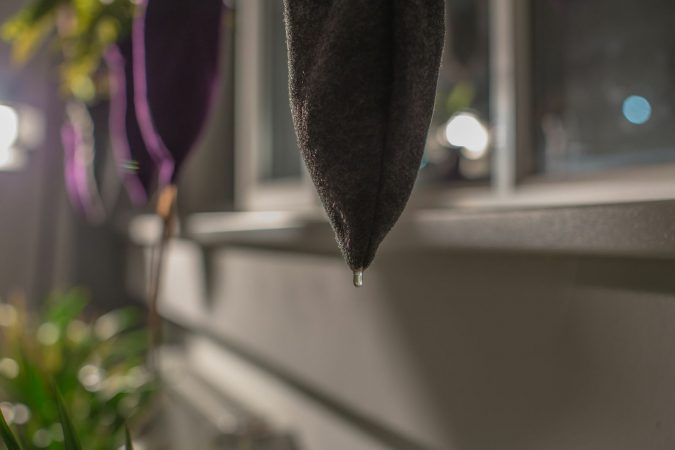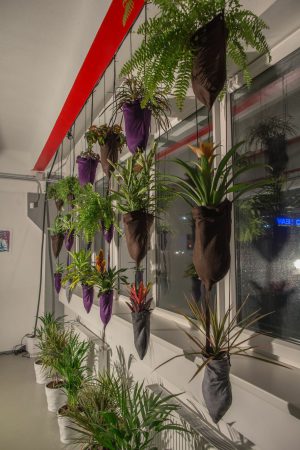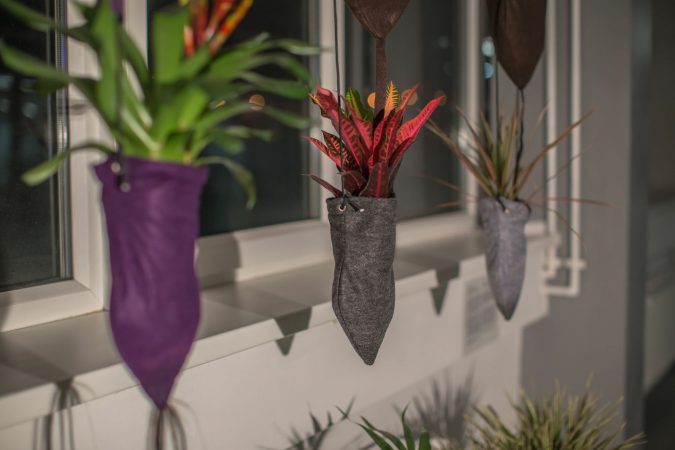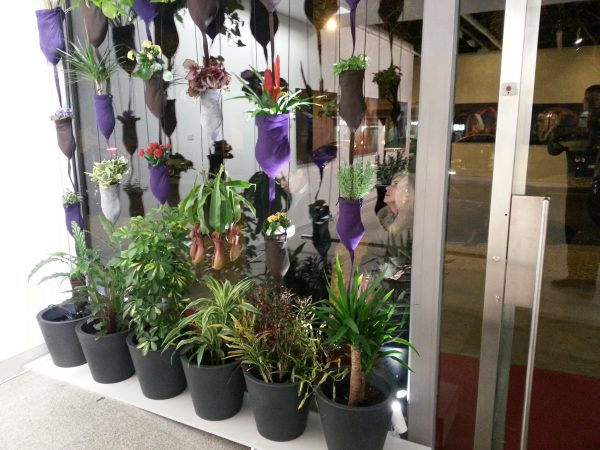The project Cascading Gardens uses biophilic design principles to create a natural and calming environment. In this living installation, the houseplants provide oxygen to the indoor spaces and salubrious psychological effects through the aesthetics of color and light.
The water pumping system makes this garden almost self-sustainable, and in winter, evaporation from the planters adds moisture back into heated buildings. The color of the bags is designed to absorb sunlight in the winter months and radiate heat back into the room, and in summer, when the sun is highest, the green plants shade the soft planters, and the soil stays cool for the health of the plant roots and humans.
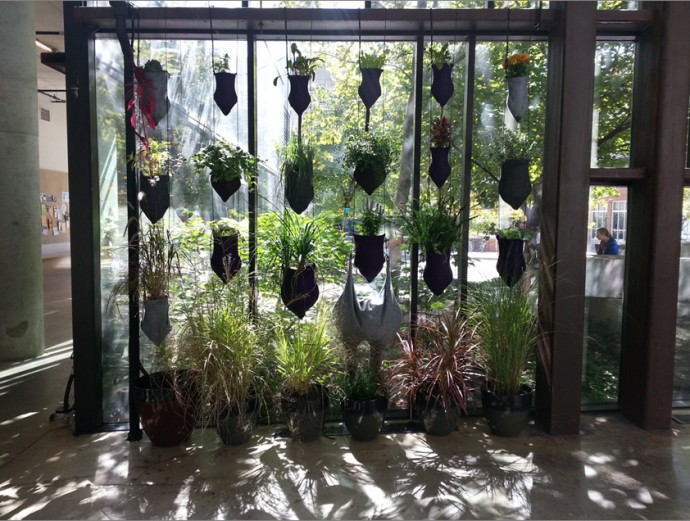
In an outdoor version of the Cascading Gardens, they are designed to grow your edible vegetables while reprocessing green household food scraps with red wiggler worms. Rainwater is collected from roofs and funned into rain barrels, and solar-powered pumps lift the water to the top planters to cascade watering from planter to planter. Solar-powered microprocessors with moisture sensors constantly monitor the moisture level of the roots, and when the roots are dry, the watering pumps are activated.
These bags with plants serve as a vertical air filter removing toxins. Spider Plants (Chlorophytum comosum) can remove up to 560 µG/H of formaldehyde Xylene and toluene. English Ivy (Hdererea helix) that does wonderfully in these grow bags removes up to 579 µG/H of benzene, 402-1120 µG/H of trichloroethylene, as well as Xylene and Toluene. Golden Pothos (Philodendron cordatum) can remove up to 353 µG/H of formaldehyde. 1
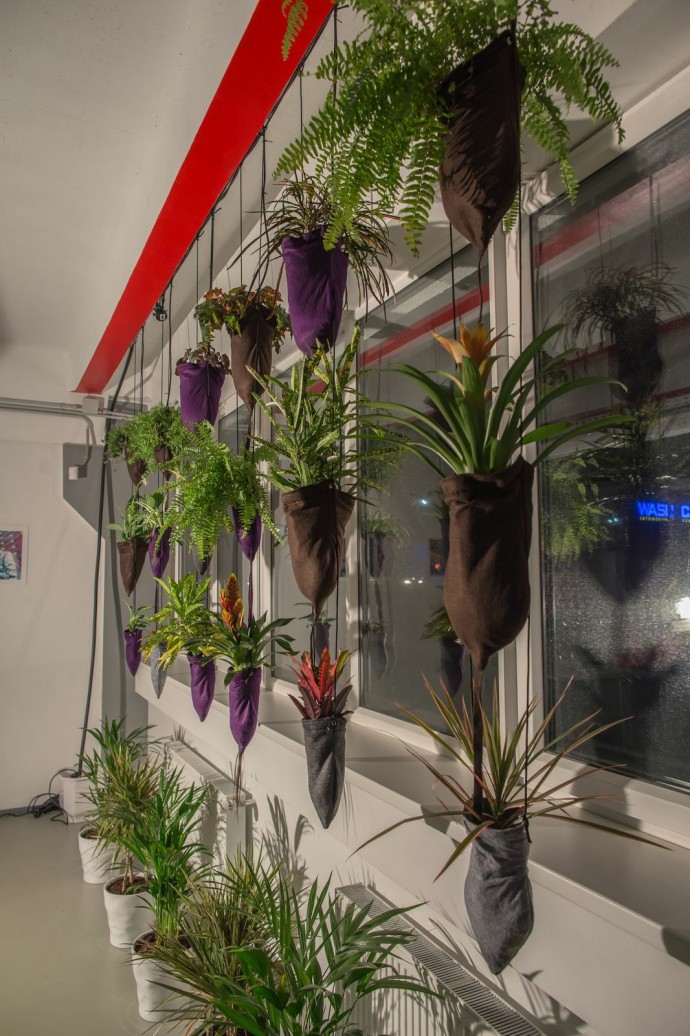
With gravity, the rainwater drips from bag to bag, cleansing the water and feeding the edible vegetables. In the last bag of this garden, red wiggler worms can eat the kitchen scraps, while bacteria, sowbugs, springtails, and fungi further help to compost creating natural fertilizer for the vegetables.
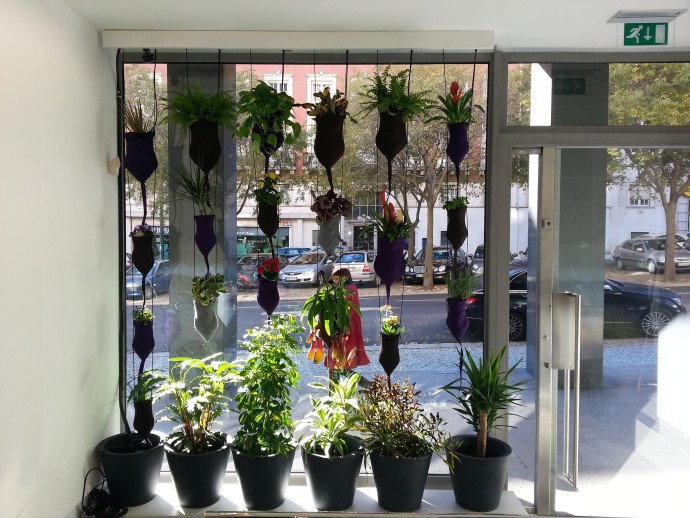
As 17- percent of all global warming methane is produced by rotting food scraps in public dumps, this system helps to reduce global warming while feeding humans local, sustainable vegetables.
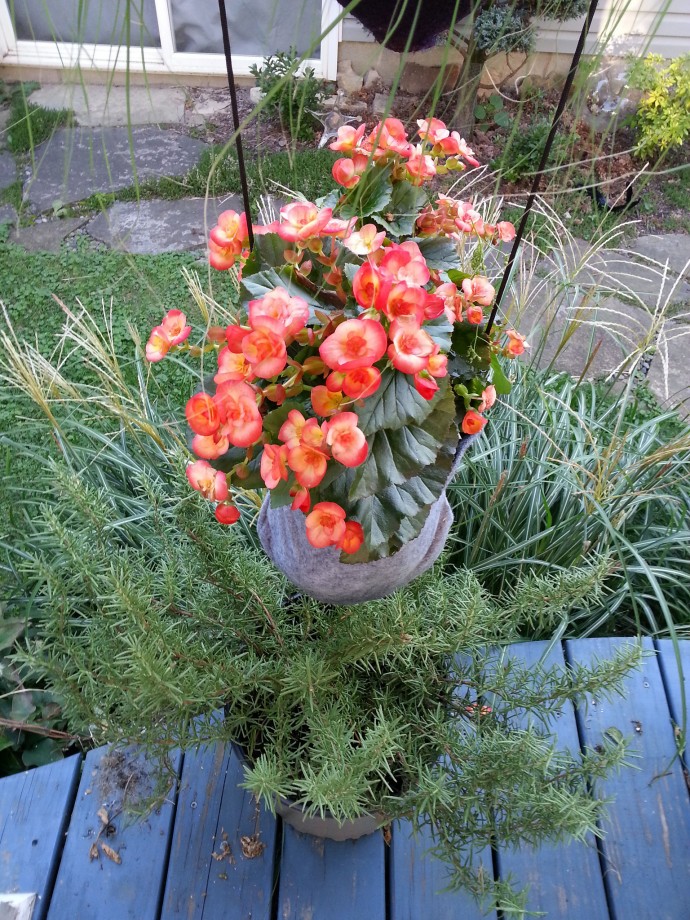
This project marks continued research toward sustainable solutions in creating food robots to feed people.
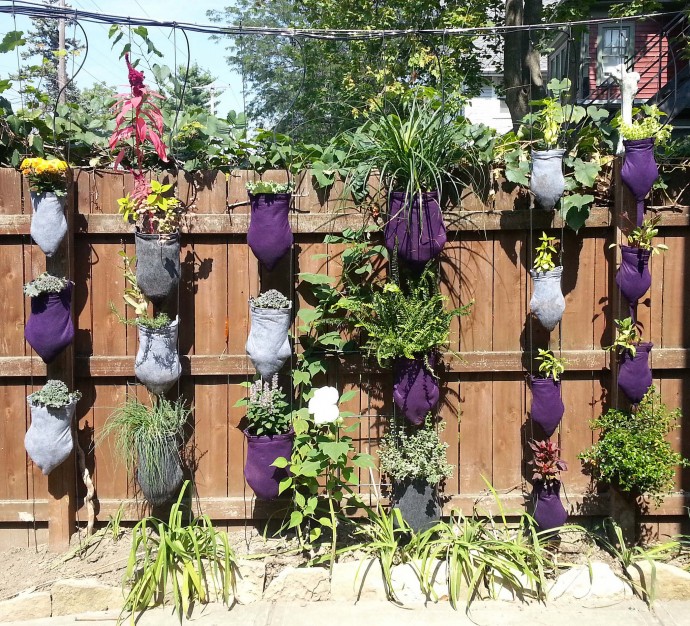
Above is a Cascading Garden in my garden in Columbus, Ohio, where I experimented with uncontested spaces between buildings/land underutilized in the urban environment.
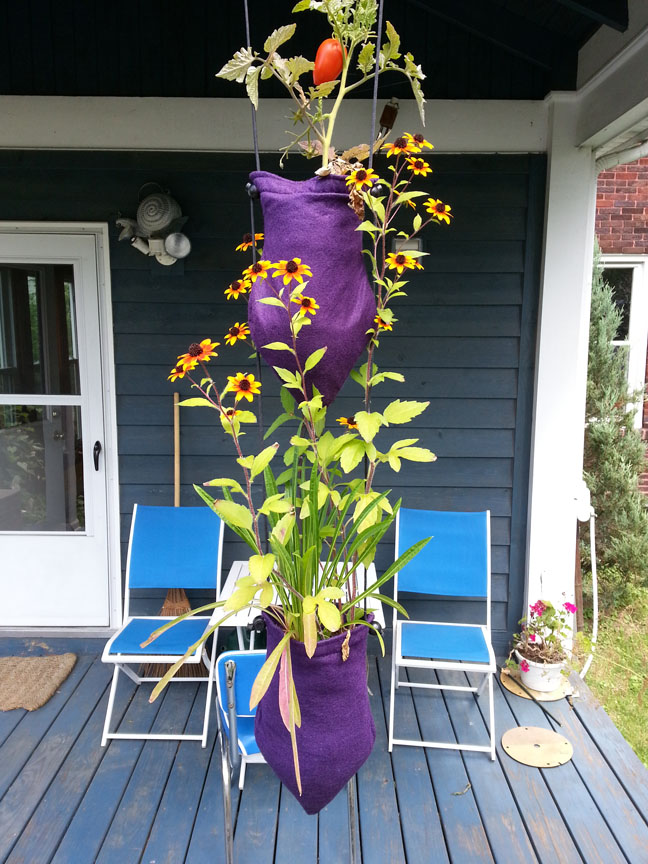
Early experiments in my garden included growing black-eyed Susan’s and tomatoes.
I have tested these bags for many years and have been excited about how they hold up and how the green and flowering foliages fill buildings and gardens with life. One of my favorate works in this series is the Weed Bags, built for Cultivamos Cultura in 2017 hosting urban weeds.
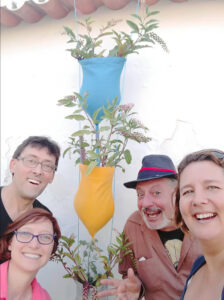
EXHIBITIONS
CULTIVAMOS CULTURA São Luís, Portugal, Summer 2017
Produce WEEDs Installation with Poke Weed plants at residency invited by Marta De Menezes.
AALBORG UNIVERSITY, Copenhagen, Denmark, March 14-18, 2016
Production of the Anthropogenic Stalactites curated by Morten Søndergaard and supported by Aalborg University.
NATIONAL CENTER FOR CONTEMPORARY ARTS, Ekacteringburg, Russia, 2013-2014 invited
Commission to create a new Cascading Garden for the Chelpipe Corporation in the City of Pervouralsk, Russia. Invited by Alisa Prudnikova
ANTONIO PRATES GALLERY, Lisbon, Portugal, 2013-2014
A one-person exhibition of seed works archival prints for series based on the wisdom of seeds and strategies of seed propagation. The new cascading garden was produced during the same exhibition invited by Antonio Prates
KNOWLTON SCHOOL OF ARCHITECTURE, Columbus, Ohio, 2013-2104
The unique cascading garden as part of an exhibition on Sustainability invited by curator/professor Kay Bea Jones
Artist and director:
Design and prototypes: Ken Rinaldo
CREDITS / TECHNICAL
Sewing prototypes Sharon Kliewer
Garden Timer: Ken Rinaldo
Seagull Bags; Daniel and John for production
Lessons on robotic installation, with electronics design and code
SHOW REQUIREMENT and DIMENSIONS
This work can be hung individually or in groups.
KEYWORDS
robotics, sustainable agriculture, biophilic design, green architecture
BIBLIOGRAPHY
Maximum Yield Indoor Gardening, 2014 pgs 34 Coverage of Cascading Gardens work
Inhabitat.com Ken Rinaldo’s Cascading Gardens Uses Vermiponics for Growing Veggies Vertically, by Jon Dioffa, 2013
TreeHugger, Vertical Vermiponis: Research project combines Worms with Hydroponics by Kimberly Mock 2013
Conk.com Rinaldo’s Cascading Gardens Uses Vermiponics for Growing Veggies Vertically.
Umbigo Magazine, The Spring Dreams of Ken Rinaldo by Mariana Machado, 12/11/13
A Green Living, Ken Rinaldo’s Cascading Garden Uses Vermiponics for Growing Veggies Vertically, Nov 7, 2013
Tech Investor News, Ken Rinaldo’s Cascading Garden Uses Vermiponics for Growing Veggies Vertically, Nov 7, 2013
News Service «URA.Ru», Worms and robots evoke imagination. Professor whose ideas inspired Microsoft, ready to help the Ural pipe makers, Xenia Fix, Photo Alexander Mamaev, 05.11.2013 18:32
Garden Culture Magazine, Vermiponic Gardens? Vertical Innovations
Written by Amber on November 15, 2013. Posted in Vertical Gardening
CURRENT EXHIBITIONS/COLLECTIONS
The Knowlton School of Architecture, The Ohio State University
Chelpipe Corporation, Russia
Antonio Prates Gallery, Lisbon Portugal
PURCHASE
kenrinaldo(AT)gmail.com
